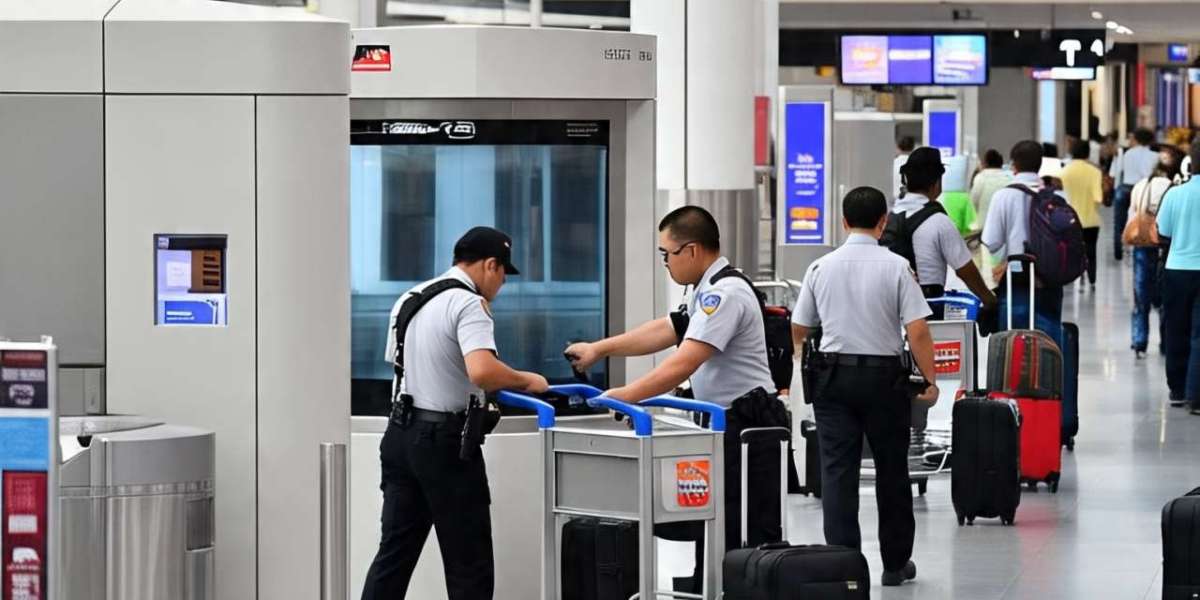Introduction: Why Airport Security Matters
Airports are bustling environments with thousands of passengers traveling daily, making them potential targets for illegal activities. Ensuring passenger and staff safety is essential to maintain smooth operations and public trust. Among various safety protocols, airport security guards play a key role in managing risk, responding to emergencies, and preventing unauthorized access. Their presence deters crime and ensures a visible layer of protection. While high-tech surveillance is crucial, human intervention remains irreplaceable in assessing and managing unpredictable real-world scenarios. This blog explores how security guards support airport safety, from routine monitoring to emergency handling.
Visible Deterrence Against Threats
The physical presence of uniformed guards alone serves as a deterrent against theft, terrorism, vandalism, and unauthorized access. Potential wrongdoers are less likely to act when they know professionals are monitoring the premises. Security guards are trained to spot suspicious behavior and react quickly, which creates a secure environment for passengers and airport staff. Unlike static CCTV, guards can intervene in real-time and handle situations on the spot. Their mobility and visibility send a strong signal that the airport is under professional protection, reducing chances of incidents significantly.
Passenger Safety and Crowd Management
Airports often deal with heavy foot traffic, especially during holidays or peak travel hours. Managing such large crowds is essential to prevent chaos, ensure smooth boarding, and maintain order. Security guards play an essential role in controlling passenger flow, assisting with directions, and calming anxious travelers. They are also trained in conflict resolution to de-escalate tensions that may arise due to delays, cancellations, or misunderstandings. Proper crowd control prevents accidents like stampedes or physical altercations, enhancing the overall travel experience for everyone involved.
Access Control and Restricted Area Monitoring
Not all airport zones are accessible to the general public. Security guards are responsible for monitoring and securing restricted areas such as boarding gates, baggage handling sections, control towers, and aircraft hangars. They ensure only authorized personnel can access these zones by verifying ID badges and using scanning systems. This reduces the risk of sabotage or smuggling activities. A well-managed access control system also supports overall airport logistics by allowing operations to run smoothly and securely behind the scenes.
Supporting Emergency Response Protocols
In case of fire, medical emergencies, or threats like bomb scares, trained security personnel are the first to act. Their training enables them to manage emergency evacuations, administer basic first aid, and coordinate with emergency services. Security guards are well-versed in airport-specific safety procedures and crisis communication, making them indispensable during high-stress situations. Their swift response can save lives and minimize damage. Additionally, they keep passengers informed and calm, which is crucial during emergencies to avoid panic.
Cooperation with Law Enforcement Agencies
Security guards don’t operate in isolation. They work closely with police, aviation authorities, and intelligence agencies to monitor ongoing threats and share relevant information. This collaboration strengthens the airport’s overall security strategy. For instance, guards may detain a suspect until law enforcement arrives or assist in controlled passenger screenings. By bridging the gap between surveillance systems and police intervention, security guards offer an immediate layer of human intelligence that helps prevent serious incidents from escalating.
Customer Service and Public Assistance
Beyond safety duties, security guards often help passengers by offering directions, answering questions, and assisting with mobility issues. Their familiarity with the airport layout allows them to guide lost travelers or help elderly and disabled passengers reach their gates safely. This dual role enhances the image of the airport as both secure and customer-friendly. While often overlooked, this aspect of their job creates a welcoming and helpful atmosphere that supports the airport’s reputation and operations.
Handling Suspicious Items and Behavior
Trained to detect suspicious packages or behavior, airport security guards are instrumental in identifying potential threats. If unattended baggage is found, guards isolate the item and call for inspection. They are also skilled in behavioral analysis, observing body language, anxiety signals, or inconsistencies in passenger movement. This proactive approach helps prevent dangerous situations before they escalate. These responsibilities require vigilance, awareness, and critical thinking, making security guards vital to preempting threats.
Enhancing Surveillance and Monitoring Systems
Though CCTV cameras provide continuous monitoring, security guards enhance the value of these systems through active coordination. Guards monitor surveillance footage in real-time and physically respond to areas where suspicious activity is detected. This integration of human and digital surveillance enables faster decision-making. Organizations offering professional airport protection solutions such as Security Guard Services ensure that guards are trained in both surveillance tech and ground-level observation, maximizing the efficiency of airport security systems.
Preventing Unauthorized Entry at Checkpoints
Security guards stationed at boarding gates and customs areas ensure that all passengers have proper documentation and screening. They are responsible for checking boarding passes, passports, and ID cards before allowing access. These procedures not only prevent unauthorized travel but also help in identifying forged or tampered documents. Guards remain alert to ensure that people are not bypassing security lines or accessing flights unlawfully, upholding international travel standards and aviation laws.
Static Security for Long-Term Airport Safety
Static security guards serve an ongoing, critical function by maintaining a consistent presence at key points within the airport. They are stationed at entrances, exits, security counters, and operational control zones to offer continuous oversight. This reliable positioning ensures all safety standards are met around the clock. Many airports choose services like professional static security support to implement this strategy effectively. These guards remain focused on the same zones, gaining familiarity that helps them detect even the smallest irregularities.
Managing Entry and Exit Points
Entry and exit gates are major checkpoints where the influx and outflow of people must be carefully controlled. Security guards are placed at these junctures to verify identities, inspect baggage, and detect any illegal goods being carried. They work closely with customs and immigration authorities to identify red flags such as fake documentation or smuggling attempts. Smooth and secure entry-exit protocols also contribute to better airport workflow and improved traveler experience.
Training and Professionalism in Airport Security
Unlike regular security roles, airport guards undergo intensive training on aviation safety protocols, emergency response, and high-pressure scenarios. This specialization equips them to handle unique challenges presented in airport environments. From operating scanners to understanding aviation law, their knowledge extends beyond routine patrolling. Continuous training ensures they stay updated with evolving threats and technological tools. Their professionalism builds passenger confidence and reassures the public that they are in safe hands.
Technology Integration and Future Readiness
Modern airports are increasingly adopting smart technologies, and security guards are being trained to operate new tools like facial recognition, biometric scanners, and AI-based surveillance. Their ability to adapt and integrate these technologies into routine checks is essential for future-proofing airport security. Human oversight remains important to interpret results and handle cases that automated systems cannot. This balanced approach will define the future of efficient, human-led security in aviation.
Conclusion: The Invaluable Role of Security Guards
In today’s dynamic travel environment, airport security guards are more than just sentinels—they are vital responders, guides, and protectors. Their ability to manage security with a human touch is irreplaceable, even with advanced technology. Whether it’s protecting restricted zones, assisting passengers, or responding to emergencies, their contributions are central to the airport ecosystem. With rising global security concerns, their role will only become more significant, ensuring that every traveler feels secure from the moment they step inside the terminal.
FAQs
1. What are the primary duties of an airport security guard?
Their duties include monitoring restricted areas, checking IDs, managing crowds, responding to emergencies, and assisting passengers.
2. Do airport security guards work with police?
Yes, they often coordinate with local law enforcement and federal agencies for security and investigation tasks.
3. Can airport guards make arrests?
They can detain suspicious individuals until the proper authorities arrive, but full arrests are handled by police.
4. Are airport security guards trained in emergencies?
Yes, they receive extensive training in emergency response, evacuation, and basic first aid.
5. What’s the difference between static and mobile guards?
Static guards stay in fixed locations for continuous monitoring, while mobile guards patrol various zones.
6. How do security guards identify suspicious passengers?
Through behavioral analysis, document checks, and surveillance system coordination.




